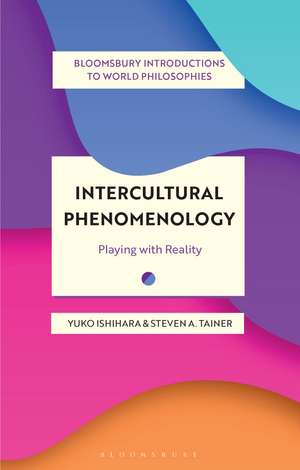Intercultural Phenomenology: Playing with Reality: Bloomsbury Introductions to World Philosophies
Autor Yuko Ishihara, Steven A. Taineren Limba Engleză Paperback – 24 ian 2024
| Toate formatele și edițiile | Preț | Express |
|---|---|---|
| Paperback (1) | 117.16 lei 22-36 zile | +26.72 lei 5-11 zile |
| Bloomsbury Publishing – 24 ian 2024 | 117.16 lei 22-36 zile | +26.72 lei 5-11 zile |
| Hardback (1) | 352.50 lei 43-57 zile | |
| Bloomsbury Publishing – 24 ian 2024 | 352.50 lei 43-57 zile |
Din seria Bloomsbury Introductions to World Philosophies
- 8%
 Preț: 119.09 lei
Preț: 119.09 lei - 15%
 Preț: 136.56 lei
Preț: 136.56 lei - 19%
 Preț: 131.83 lei
Preț: 131.83 lei - 19%
 Preț: 145.90 lei
Preț: 145.90 lei - 19%
 Preț: 119.26 lei
Preț: 119.26 lei - 18%
 Preț: 114.50 lei
Preț: 114.50 lei -
 Preț: 138.93 lei
Preț: 138.93 lei - 19%
 Preț: 119.09 lei
Preț: 119.09 lei - 8%
 Preț: 147.69 lei
Preț: 147.69 lei - 13%
 Preț: 113.40 lei
Preț: 113.40 lei - 6%
 Preț: 117.16 lei
Preț: 117.16 lei -
 Preț: 122.63 lei
Preț: 122.63 lei - 18%
 Preț: 114.04 lei
Preț: 114.04 lei - 8%
 Preț: 133.61 lei
Preț: 133.61 lei - 21%
 Preț: 117.16 lei
Preț: 117.16 lei - 8%
 Preț: 133.15 lei
Preț: 133.15 lei -
 Preț: 148.45 lei
Preț: 148.45 lei - 7%
 Preț: 123.53 lei
Preț: 123.53 lei - 19%
 Preț: 130.49 lei
Preț: 130.49 lei
Preț: 117.16 lei
Preț vechi: 125.18 lei
-6% Nou
Puncte Express: 176
Preț estimativ în valută:
22.42€ • 23.47$ • 18.55£
22.42€ • 23.47$ • 18.55£
Carte disponibilă
Livrare economică 17-31 martie
Livrare express 28 februarie-06 martie pentru 36.71 lei
Preluare comenzi: 021 569.72.76
Specificații
ISBN-13: 9781350298286
ISBN-10: 135029828X
Pagini: 176
Dimensiuni: 138 x 216 x 25 mm
Greutate: 0.45 kg
Editura: Bloomsbury Publishing
Colecția Bloomsbury Academic
Seria Bloomsbury Introductions to World Philosophies
Locul publicării:London, United Kingdom
ISBN-10: 135029828X
Pagini: 176
Dimensiuni: 138 x 216 x 25 mm
Greutate: 0.45 kg
Editura: Bloomsbury Publishing
Colecția Bloomsbury Academic
Seria Bloomsbury Introductions to World Philosophies
Locul publicării:London, United Kingdom
Caracteristici
Introduces the philosophy of play, central to the father of the Kyoto School, ancient Greeks and French phenomenologists
Notă biografică
Yuko Ishihara is Associate Professor at the College of Global Liberal Arts at Ritsumeikan University, Japan. She specializes in Kyoto School philosophy and classical phenomenology. Her research includes a focus on the topic of play and, specifically, how modern philosophers have turned to the notion of play to overcome the metaphysics of subjectivity.Steven A. Tainer has studied Asian contemplative traditions intensively since 1970 with Tibetan, Chinese and Korean masters. After practicing for decades in both mountain retreats and ordinary life circumstances, he began teaching Buddhist, Taoist and Confucian fundamentals to private groups and at the Berkeley Buddhist Monastery in Berkeley California, USA.
Cuprins
List of FiguresSeries Editor PrefaceAcknowledgements Introduction Part I1. An Invitation to Play with Reality 2. Falling into Play 3. Openness, Playfulness and Freedom 4. Practicing Playing 5. A Conversation with Contemplative Traditions Part II6. Practicing Phenomenology-the Historico-Theoretical Context 7. Practicing Phenomenology-the Personal Side in Practice and 'Play' 8. Japanese Perspectives on 'Practice', 'Nature', and 'Play' Recommended Readings Notes BibliographyIndex
Recenzii
This sparkling book is an antidote to technical philosophy closed to non- specialists. Instead of working through abstract ideas detached from ordinary life, its chapters and exercises open fresh access to philosophy that deepens as well as widens a direct and playful engagement with reality.
This book presents the dialogue between the phenomenology of Husserl and Heidegger and the Japanese Zen practice integrating philosophy of NIshida and Ueda. In it, the deep dimension of pre-linguistic experience accessible through Husserl's phenomenological reduction is clearly revealed, from which the subject-object duality arises and into which it dissolves.
Drawing on Japanese and other Asian as well as European thinkers, this refreshingly accessible book reenvisions the phenomenological epoché as a practice of suspending our pre-judgments-of removing our "colored glasses"-so that we can learn to cooperatively play with the various ways in which reality manifests itself.
This book presents the dialogue between the phenomenology of Husserl and Heidegger and the Japanese Zen practice integrating philosophy of NIshida and Ueda. In it, the deep dimension of pre-linguistic experience accessible through Husserl's phenomenological reduction is clearly revealed, from which the subject-object duality arises and into which it dissolves.
Drawing on Japanese and other Asian as well as European thinkers, this refreshingly accessible book reenvisions the phenomenological epoché as a practice of suspending our pre-judgments-of removing our "colored glasses"-so that we can learn to cooperatively play with the various ways in which reality manifests itself.
